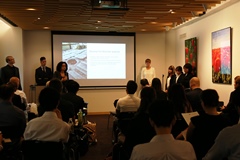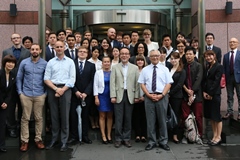School of Political Science and Economics: Proposal of initiatives for tourist attraction at the Embassy of the Netherlands
Aug. 23, 2016


On July 13, the Embassy of the Netherlands (in Tokyo’s Minato Ward), was the site of a meeting held for the presentation of the results of studies under the Vision on International and Business-related Education (VIBE) Program for international internship. The Program is being conducted by the Meiji University School of Political Science and Economics in partnership with J.F. Oberlin University, the Rotterdam Business School in the Rotterdam University of Applied Sciences, and the Faculty of Social Sciences and Business Studies in the University of Eastern Finland. For the presentation meeting, the students broke into two groups, one for Meiji University and the other for J. F. Oberlin University. The Meiji University group consisted of eight students from the two European universities studying at Meiji University and six Japanese students enrolled in the School of Political Science and Economics and the School of Business Administration. Their presentation was on approaches to sale of Mashiko sake and pottery in Europe and to attraction of Europeans tourists and business persons to the town of Mashiko in Tochigi Prefecture. Identification of such approaches was the subject of the internship studies they did in Mashiko in late May.
◇The VIBE Program
The VIBE Program rests on subsidies from the Industrialised Countries Instrument Education Cooperation Programme (ICI-ECP), which is implemented by the European Union (EU) and the Japanese government. It encompasses a joint student exchange program with international internship under an agreement concluded by the four universities and a project for the exchange of teachers (exchange of teaching methods). (The period of implementation is October 2014 – September 2017.)
◇The VIBE Program
The VIBE Program rests on subsidies from the Industrialised Countries Instrument Education Cooperation Programme (ICI-ECP), which is implemented by the European Union (EU) and the Japanese government. It encompasses a joint student exchange program with international internship under an agreement concluded by the four universities and a project for the exchange of teachers (exchange of teaching methods). (The period of implementation is October 2014 – September 2017.)


